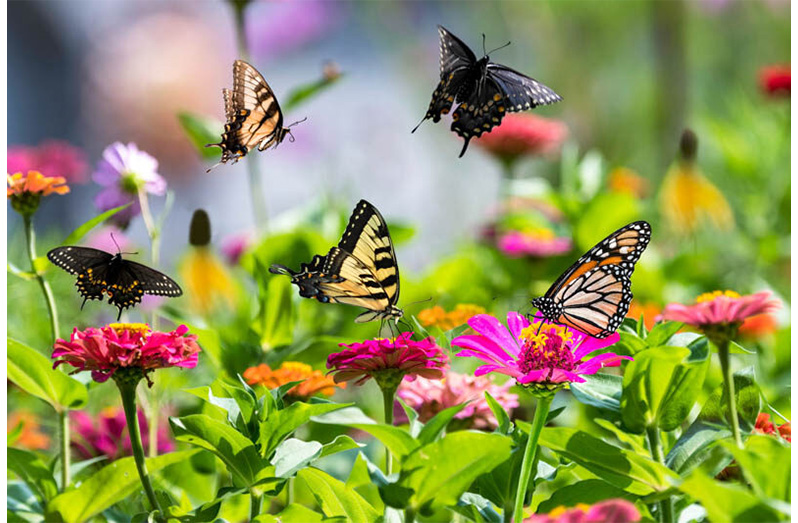THE little girl ran around the garden, playing whilst her mother and brothers cleaned the weeds from the plant beds and watered the vegetable plants. She loved the colourful butterflies flying around, alighting on the plants, laughing and tumbling over sometimes as she tried to catch them.
Her mother called out to her to be careful, and as the afternoon grew late, the butterflies left. She then picked up a small basket of tomatoes that she had helped to pick.
Their garden was a piece of land across the road from the house, alongside which was a trench. That was a long stretch of land owned by the sugar estate, and homeowners were allowed to plant in the area in front of them. Not everyone did, but it was something good to sustain a family’s needs with fresh, organic fruits and vegetables.

It was a country life, pure and simple, with peace, quiet, and friendly neighbours. School was within walking distance, and along the way, the little girl, Marissa, often stopped to pick wildflowers on the wayside to give to her teacher. She was loved for her petite nature, her cheerful smile, and her long hair in plaits.
She had a passion for reading, and as she advanced into higher classes, history became quite a fascination for her, and she felt intrigued by the stories of her ancestors’ journey across the Kala Pani and plantation life.
“It’s like leaving one world and coming into another,” she mused.
She learnt a lot from listening to families and neighbours talking on various topics in politics and the economy. At that young age, though, she couldn’t comprehend what it all meant, but as she grew older, she understood the adults’ uncertainty, worry and fear of a change imposed on their lives.
As a child, she couldn’t see the changes or feel their impact, and she was studying for her Common Entrance examinations when her father announced they would be leaving to live in North America.
Marissa didn’t take that too well, unhappy about leaving the place and home she loved so much. She would miss her friends, her teacher, and most of all, she would miss the garden and the beautiful butterflies.
She had cried that early morning when they were bundled, still sleepy, into the bus — her young heart breaking as they began their journey to a new place, a new life.
The small apartment was so different from the warmth and cheerfulness of home — birds chirping as the sun rose in the morning, soft devotional songs on the radio, the aroma of breakfast in the air, and the friendly voices of the neighbours.
“I want to go back home,” she often told her mother and father.
But they were adamant they had to stay, to start a new life in this new country.
“One day, you will understand the reason,” her father had told her.
She went to school with her brothers on a bus, and when they came back home, their mother was not there, as she usually was. She had gone to work. There was no hot, fresh food on the table, and Marissa started crying again.
She didn’t see her father for two days because he was working double shifts.
“What a wonderful life!” she had sighed with sarcasm.
As time went on, she saw people she knew from her street and community back home, living in apartments and basements in the neighbourhood where she lived, and she had wondered, “Why is everyone leaving?”
It had made her feel sad, for their ancestors had worked hard with unbroken resolve, putting their shoulders to the grind and leaving a legacy that was an inheritance for the generations to follow.
“That flame has to be kept burning,” she intoned.
Many of those who migrated, however, did not want to return, elated that they had left a poor country for a wealthy one, never mind the long working hours and scant free time.
It was, for them, a paradise, and the country back home had become, in their minds, unworthy.
Marissa shook her head in mock annoyance, trying not to show how upset she was, and murmured, “One day… one day.”
She wasn’t sure why she voiced those words — maybe she felt that deep within her, things in her country would be good and life would be better.
Her family took her to many different places whenever they could afford the time — the enchanting Disneyland, exciting water parks, the zoo, and the museum, which fascinated her young mind. The friends she made from her country and other countries were so awed by life in their new country that they expressed they would never leave.
The one thing, though, in Marissa’s mind was that, “It’s not home.”
High school was a significant step up in her studies, and one day in class, while reading about American history, she said to herself, “I should be studying Caribbean history.”
And that day, she made a promise to herself to study hard to earn a degree in law so she could return home to serve the people of her country.
Ten years later, she made good on that promise and returned home. She got admitted to the Bar and began her work as a young lawyer.
“Finally,” she expressed, joy in her heart, “I’m home. We can’t all leave — the motherland needs her children.”
Her father had returned with her to help her resettle, and it saddened her heart to see the changes in the street where she had lived. Most people had migrated, and a few of the old ones had passed away. Houses were closed, rented or sold to strangers. The neighbourliness, the engaging conversation, and laughter were no longer there, and bushes had taken over the gardens across the road.
“This is awful,” she exclaimed, “Where did it all go?”
Her father refurbished their house for her comfort and convenience and hired a daily gardener to resuscitate the garden.
As the days and months passed, Marissa studied the country’s politics, economy, resources, trade, people, and society as a whole. That knowledge was important to her for the various cases she would be retained for as counsel.
People began to hear about the young attorney, her brilliance, and the high success rate of her cases, which she won for low-income individuals and abused women.
Soon, many were reaching out to her, and often she was told, “You have quite a refreshing personality, you’re God-sent, you’re a blessing.”
She always smiled warmly and said “thanks”, for helping people gave her a deep sense of satisfaction.
The rest of her family came regularly to visit, and as things improved in the country, more people from her street returned for regular visits — with a few deciding to remigrate — and that filled Marissa’s heart with such joy.
It felt like the street and community were being reborn, and she exulted, “There is no place in the world better than home.”
And in the afternoons, when she could be home early, she went into the garden to pick vegetables and watch the butterflies flying around.
From a little girl, it was what she loved, and she knew in her heart it would be for her forever.


.jpg)











